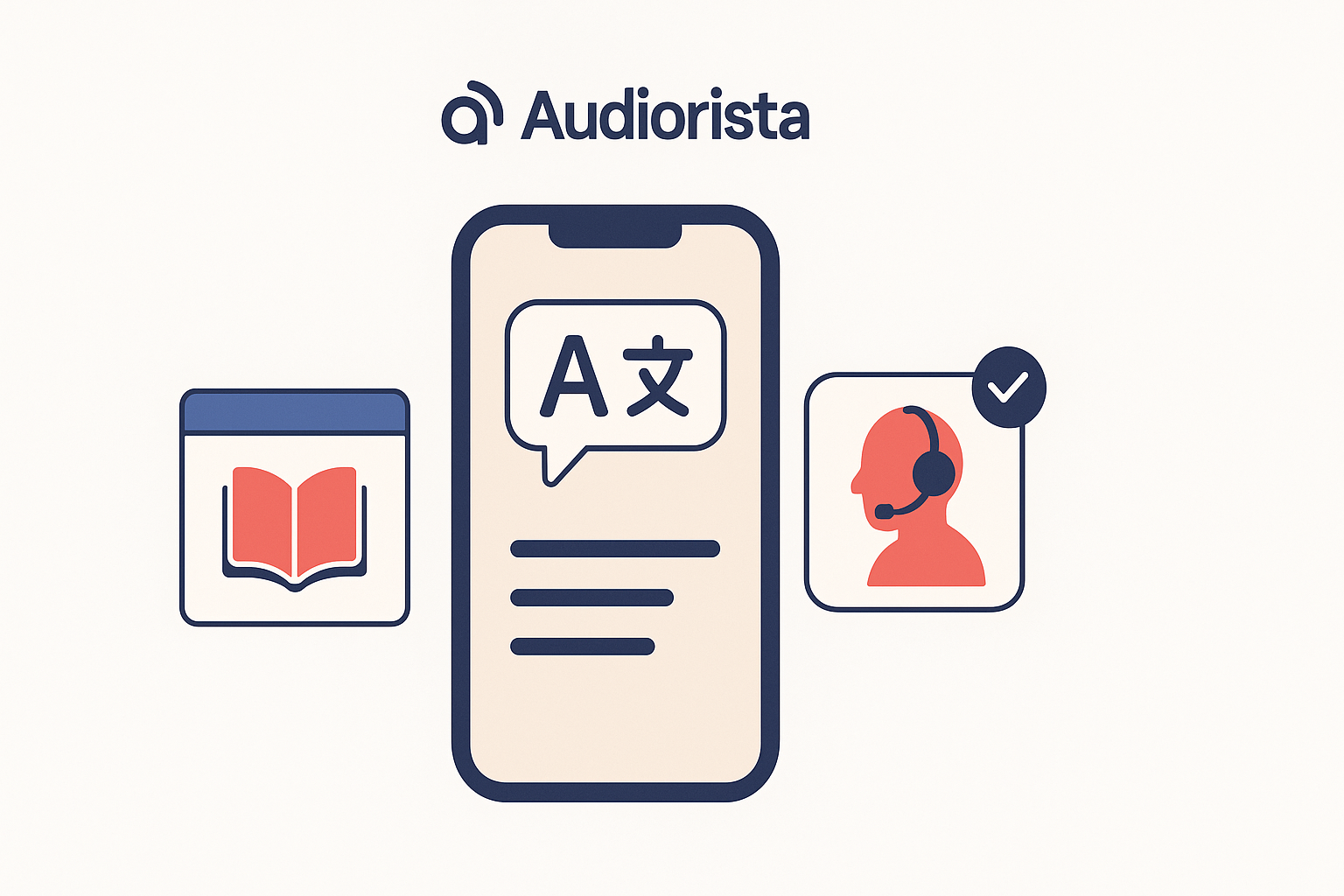Best Translation and Interpretation Apps for Skills Training

Finding the right app to improve translation and interpretation skills has become a top priority for learners, educators, and professionals. The demand for flexible, mobile-friendly tools continues to rise as translators and interpreters seek more effective ways to train and practice. While many rely on existing translation tools and interpretation software, there’s also a growing need for customized training platforms that support professional development at scale.
Audiorista offers a unique solution as a no-code app builder, giving educators, institutions, and businesses the ability to create branded training apps. With Audiorista, you can deliver audio, video, and text-based resources to learners anywhere in the world—without any coding required. The platform’s intuitive interface enables rapid app creation, letting you launch a fully branded mobile or web app tailored to your training needs. This guide explores the landscape of translation and interpretation apps available today and shows you how to create your own custom training platform with Audiorista.
Why translation and interpretation apps matter
The use of translation and interpretation apps is growing rapidly as online training becomes the standard for professional skill development. Remote translation and interpretation tools provide continuous access to resources without requiring learners to attend in-person sessions. This makes them essential for globally connected industries where interpreters and translators need to stay sharp and up-to-date.
Apps allow for self-paced learning, letting professionals engage in exercises whenever and wherever they choose. This flexibility is particularly beneficial for practicing interpreting scenarios, iterative translation exercises, and reinforcing vocabulary. With integrated audio, video, and text, technology ensures that practice sessions can mimic real-world interpreting and translation contexts more effectively than textbooks or isolated lessons.
Key features for effective training apps
Not all translation and interpretation apps are designed with skill development in mind. For effective training, the following features should be prioritized:
- Audio publishing for practice – essential for working with live dialogues and speeches
- Bilingual text publishing – supports direct translation exercises and side-by-side comparison
- Video lessons and cultural context – important for adding depth to communication skills
- Subscription access – allows for ongoing skills development through updated materials
Apps available in the market
There are numerous apps available for translators and interpreters, ranging from general-purpose mobile translation tools to more specialized platforms for training. Generic apps offer convenience and quick reference for vocabulary or translations, but they often fall short when it comes to structured professional-level learning. They’re designed for broad audiences, not for the nuanced needs of interpreters who require focused training in real-world scenarios.
Dedicated training platforms offer a more specialized environment, but they can be restrictive or hard to customize, limiting the ability of institutions and trainers to build their own branded programs. For those focused on growing their skills in a professional context, these limitations can be a barrier to consistent improvement.
Building custom apps with Audiorista
This is where Audiorista stands out as a white-label education app builder. With Audiorista, it’s easy to deliver interpreter training, translation exercises, or hybrid language-learning experiences in a branded mobile app. Educators, enterprises, and training institutions can quickly scale up their reach by publishing content across audio, video, and text formats without any technical overhead.
Audiorista supports multiple use cases including:
- Interpreter training apps
- Mobile apps for translation skills
- Language learning app creation
- E-learning platforms tailored to translators
If you’re looking to create a branded interpreter training app or explore how educators are building translation skills apps with white-label technology, Audiorista provides a ready-to-launch solution for schools, trainers, and institutions.
Creating subscription-based training platforms
One of the most powerful ways to deliver translation and interpretation training is by turning courses into a subscription-based app. This approach provides continuous learning opportunities for subscribers while giving organizations a sustainable revenue model. With Audiorista, you can easily monetize your training content through flexible subscription plans, in-app purchases, or pay-per-access models. Learning materials can be updated regularly without the costs of reprinting or distribution, keeping content fresh and relevant.
A subscription-based interpreter app also consolidates all learning formats into one environment: audio exercises for interpretation, video lessons with cultural context, and bilingual text for translation practice. This seamless integration makes training more effective and more engaging for learners.
For detailed steps on how to launch a subscription-based interpreter app and explore the benefits of turning training courses into subscription apps, Audiorista offers practical guidance tailored to educators and enterprises.
Improving skills through continuous practice
Translation and interpretation apps make it possible to build structured routines for professional skill growth. Daily practice with curated audio materials, bilingual exercises, and role-play recordings helps interpreters to sharpen their linguistic reflexes and handle real-world scenarios with greater confidence. Audiorista’s built-in progress tracking and analytics features ensure that learners can measure their development over time and target areas that need improvement.
Branded mobile apps also give institutions and enterprises the ability to design customized training experiences. For example, organizations can develop translation skills courses designed for specific sectors, enabling learners to acquire the specialized vocabulary and cultural awareness required for professional contexts. With continuous access to structured exercises, professionals can improve their interpretation and translation skills at their own pace, supported by a digital training environment tailored to their goals.
Ready to launch your own branded translation and interpretation skills app? Start building with Audiorista today and give your learners a powerful mobile-first training experience.


